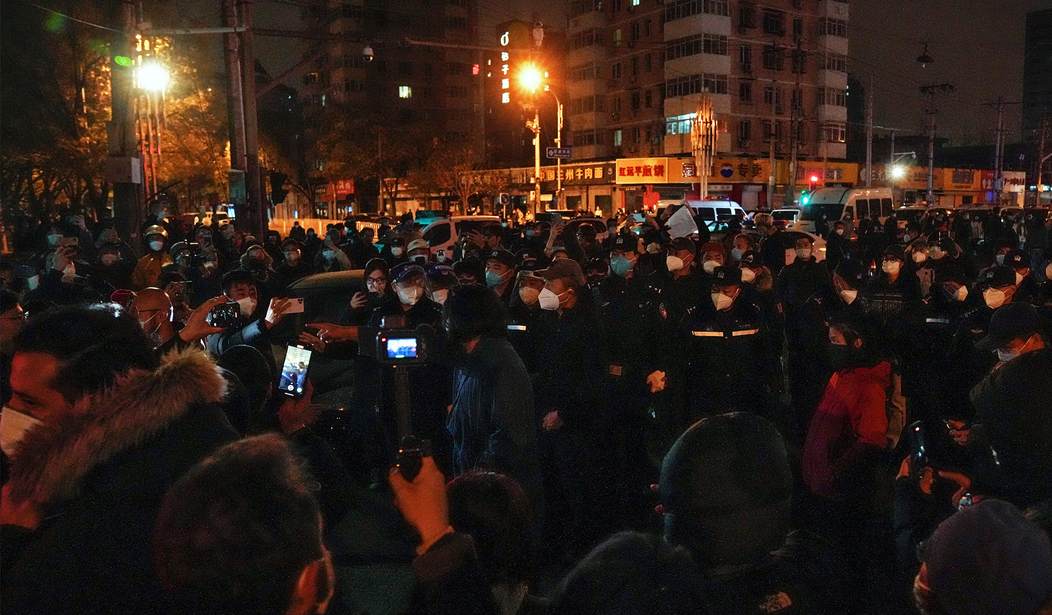Last November, people in China made news for protesting the "zero-COVID" lockdowns imposed by Xi Jinping and the Chinese Communist Party (CCP). Despite the bravery of these people who risked much protesting the regime, the Biden administration largely stayed silent on the protests, and what responses did come were lacking and unsatisfactory. Some far-left outlets even opposed the protesters' requests, even if it meant defending "zero-COVID" and the draconian lockdowns, like The Atlantic. Now that the CCP has ended the policy, having no choice, similarly far-left outlets are once again defending China.
As our friends at Twitchy highlighted, this includes a Tuesday piece from Vox's Rachel DuRose, "What can the world learn from China’s “zero-Covid” lockdown?" The response should be to not make use of those lockdowns, but this is Vox we're talking about here.
The ratioed tweet sharing the article defended such lockdowns even more so, as if the fact that it was coming from Vox didn't already make that a given. As of Wednesday night, there were over 750 replies taking issue with the piece, with most of the retweets being quoted retweets doing the same.
Thanks for reminding us why your organization is a failure, about to go bankrupt, and has lost any shred of credibility. Go lock yourself down if you love lockdowns so much.
— Christina Pushaw 🐊 🇺🇸 (@ChristinaPushaw) January 31, 2023
It’s just astonishing. These people will argue, “no one ever advocated adopting China’s lockdowns,” then the very next day publish a long article urging everyone to adopt China’s lockdowns. I mean, it’s right there, the article literally uses the word “lockdown” 35 times.
— Michael P Senger (@MichaelPSenger) January 31, 2023
I cannot believe that in 2023 there are legitimately still people who believe this after the unequivocal failure of lockdowns to end the pandemic over the past few years https://t.co/kUTU7kSC5u
— Ian Miller (@ianmSC) February 1, 2023
It's extremely embarrassing, if not a Crime Against Humanity, to post this.
— Free Speech Rules (@MySpeechIsFreed) January 31, 2023
Many of us have PTSD for losing 3 years of our lives, income, businesses, jobs, careers, & loved ones.
It's shameful.
The piece is a lengthy one, at over 2,00 words. DuRose begins by mentioning how people in China were allowed to interact with each other for the Lunar New Year, which "coincided with--and are sure to exacerbate--a Covid-19 outbreak currently spreading throughout the country."
Therein lies the first problem, and there's plenty more. It wasn't just that people couldn't celebrate the holidays with loved ones, though DuRose at least points out it was the first time in three years that they could do so. It was that the Chinese people were subject to particularly cruel lockdowns.
Recommended
For instance, the Chinese people were protesting how a fire turned deadly because firefighters could not reach the victims due to lockdowns. DuRose does mention this a couple of paragraphs later, but it's not enough to exonerate her and her piece. Further, there's no mention of footage from last April that showed drones flying by, ordering people to keep quiet and not even go onto their balconies while they screamed out for freedom. There's also no mention of how China was inexplicably allowed to host the Olympics after unleashing this virus on the world, where athletes were subject to harsh conditions in their quarantine hotels under the "zero-COVID" policy.
But that's just the opening paragraph, and it doesn't get any better from there.
As other leftists do, DuRose laments the surge in COVID following the relaxation of policy. First of all, the virus is endemic, it's pretty much going to stick with us in some way, shape, or form. China also has the most people on the planet. It's also worth questioning as to if these people really believe that China didn't have COVID cases before, which has been questioned, or if they were just good at hiding the numbers.
Being run by the CCP effectively means by definition that China is not free. People still wanted freedom though, and that includes freedom from lockdowns which did not appear to ever be fully over until Xi's power was threatened.
There's no mention of that longing for freedom, though, in DuRose's piece, or about how ruthless the CCP is. The closest DuRose herself gets is by mentioning how an "extended lockdown sparked anger among residents and would add fuel to the growing anti-government sentiments that manifested via protests later that year." Because calling out for an end to draconian policies can just be summarized by "anti-government sentiments."
"Beijing’s decision to end zero-Covid policies may have saved the nation from further social chaos. But how it eased up resulted in a public health crisis, with an estimated 2.02 million government-confirmed Covid-19 cases (though that’s likely an undercount) as of January 29, compared to 119,836 cumulative cases a year ago," she writes.
By comparing cases, DuRose ignores the cost of freedom even further. Other countries, like Australia and New Zealand, also justified draconian policies at the cost of supposedly having fewer cases. And such places are supposedly more free countries. DuRose goes on to casually mention New Zealand later on in the piece as well when talking about countries that unleashed similar policies. "New Zealand, an island country with a zero-Covid approach, prevented Covid cases and deaths early in the pandemic by closing its borders," she wrote.
When it comes to lockdowns in general, what concessions DuRose does mention make her piece all the more chilling. "Lockdowns aren’t a popular public health strategy when strung out for long periods of time," she acknowledges, also writing they "cannot contain a disease like Covid-19 indefinitely." So what is the point of the regime keeping with "zero COVID" policies for as long as they did, and when, if not for the threat to Xi's power, was it ever going to end?
That DuRose fails to ask this question is even more sorely felt when it comes to her criticizing the lifting of the policy later in the article:
However, China lifted these policies not because it was prepared to do so, but because of political pressure from the nationwide protests, said Ha-Linh Quach, a research assistant at Duke NUS medical school in Singapore. Quach — who also previously worked with Vietnam’s National Committee of Covid-19 — said Vietnam followed China’s lead when attempting to manage the spread of the virus, but also found that mass quarantines were publicly unpopular. Instead, in 2021 the country began prioritizing social distancing, mask-wearing policies, and vaccine distribution.
Unlike other countries — like Taiwan, South Korea, or Singapore — that used periods of strict lockdowns to prepare for their inevitable reopening, and the internal travel that it would spawn, China did no such thing, said Uretsky.
Rather than reopening in stages, China lifted many of its most useful measures all at once — despite the fact that prior to easing these regulations, Covid cases were already on the rise. “Unfortunately for China, lack of preparation for the inevitable breach of an increasingly infectious pathogen results in exactly what we’re seeing,” said [Maureen Miller, an epidemiologist with the Mailman School of Public Health at Columbia University].
DuRose may have expected too much from the CCP.
China's lockdowns are also further justified under an entire section, based on how "Lockdowns worked during SARS. China hoped they would work again."
Later in that section, DuRose still remains firm in that some lockdowns supposedly worked. "In mid-2021, even nations that had maintained low case numbers and death rates through lockdowns adjusted their policies, and instead focused on vaccination campaigns and ramping up contact tracing efforts," she wrote with added emphasis.
DuRose closes her piece with a section on "What this teaches us for the next pandemic," but if anything can be learned from this debacle of a piece, it's that her advice ought not to be consulted. This is especially when she once more cites Maureen Miller, an epidemiologist at Columbia University who is quoted throughout the piece, who advocates for lockdowns, so long as one distinguishes between "short-term lockdowns with underlying goals” and “long-term lockdowns that hope to beat the odds and keep Covid out indefinitely."
It is not until the closing of DuRose's very lengthy piece that she mentions the real harm of lockdowns, though it's by quoting others:
This is why it’s important to distinguish between “short-term lockdowns with underlying goals” and “long-term lockdowns that hope to beat the odds and keep Covid out indefinitely,” said Miller. Brief lockdowns that helped “flatten the curve” were effective and helped keep hospitalizations and deaths down. But extended lockdowns, like the ones seen in China, failed to contain the virus and damaged the country’s economy and well-being.
“As we have seen, these lockdowns are very disruptive, in terms of economic livelihood, as well as social life and even mental health,” said [Jennifer Bouey, chair of the global health department at Georgetown University]. “There is profound damage to the society and to the economy.”
For such a lengthy piece from DuRose, it sure is selective. Another detail she leaves out is a study released early last year from The Johns Hopkins Institute for Applied Economics, Global Health, and the Study of Business Enterprise. It found that “lockdowns have had little to no effect on COVID-19 mortality," and in the U.S. and Europe, "only reduced COVID-19 mortality by .2% on average."
Further, there's no mention of how lockdowns led to severe health and societal problems like alcoholism and exasperated mental health problems in young people, or the catastrophic learning losses and lowered school standards. Such effects are likely here to stay for a generation.
It's astounding how these leftists can treat China and the CCP as if it were a free, western nation, or to ignore the problems caused by the lockdowns themselves. Then again, we perhaps shouldn't be so surprised.

























